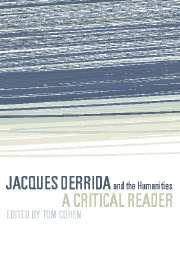Book contents
- Frontmatter
- Contents
- Preface
- Acknowledgements
- Biographical chronology
- Introduction: Derrida and the future of …
- Chapter 1 The future of the profession or the university without condition (thanks to the “Humanities,” what could take place tomorrow)
- Chapter 2 Derrida and literature
- Chapter 3 Derrida and gender: the other sexual difference
- Chapter 4 Derrida and aesthetics: Lemming (reframing the abyss)
- Chapter 5 Derrida and representation: mimesis, presentation, and representation
- Chapter 6 Derrida and philosophy: acts of engagement
- Chapter 7 Derrida and ethics: hospitable thought
- Chapter 8 Derrida and politics
- Chapter 9 Derrida and law: legitimate fictions
- Chapter 10 Derrida and technology: fidelity at the limits of deconstruction and the prosthesis of faith
- Chapter 11 Derrida and history: some questions Derrida pursues in his early writings
- Chapter 12 Derrida and psychoanalysis: desistantial psychoanalysis
- Glossary
- Index
- References
Chapter 12 - Derrida and psychoanalysis: desistantial psychoanalysis
Published online by Cambridge University Press: 22 September 2009
- Frontmatter
- Contents
- Preface
- Acknowledgements
- Biographical chronology
- Introduction: Derrida and the future of …
- Chapter 1 The future of the profession or the university without condition (thanks to the “Humanities,” what could take place tomorrow)
- Chapter 2 Derrida and literature
- Chapter 3 Derrida and gender: the other sexual difference
- Chapter 4 Derrida and aesthetics: Lemming (reframing the abyss)
- Chapter 5 Derrida and representation: mimesis, presentation, and representation
- Chapter 6 Derrida and philosophy: acts of engagement
- Chapter 7 Derrida and ethics: hospitable thought
- Chapter 8 Derrida and politics
- Chapter 9 Derrida and law: legitimate fictions
- Chapter 10 Derrida and technology: fidelity at the limits of deconstruction and the prosthesis of faith
- Chapter 11 Derrida and history: some questions Derrida pursues in his early writings
- Chapter 12 Derrida and psychoanalysis: desistantial psychoanalysis
- Glossary
- Index
- References
Summary
DERRIDA AND PSYCHOANALYSIS
In a text written at the beginning of the 1990s, Jacques Derrida pressingly raises the following question: “Will we forget psychoanalysis?” He is indeed concerned with the symptoms of forgetting already at work in philosophical and in public opinion in general, not to mention what – also in the order of forgetting – can be observed in the psychoanalytic field itself and in its institutions:
A worry about what I'd call, vaguely, free-floatingly (but the thing itself is vague, it lives on being free-floating, without a fixed contour), the climate of opinion, the philosophical climate of opinion, the one we live in and the one which can give rise to philosophy's weather reports. And what do the reports of this philosophical doxa tell us? That, among many philosophers and a certain “public opinion” (another vague and free-floating instance), psychoanalysis is no longer in fashion, having been excessively in fashion in the 60's and 70's, when it had pushed philosophy far away from the centre, obliging philosophical discourse to reckon with a logic of the unconscious, at the risk of allowing its most basic certainties to be dislodged, at the risk of suffering the expropriation of its ground, its axioms, its norms and its language, in short of everything philosophers used to consider as philosophical reason, philosophical decision itself, at the risk, then, of suffering the expropriation of what – this reason very often associated with the consciousness of the subject or the ego, with freedom, autonomy – of what seemed also to guarantee the exercise of an authentic philosophical responsibility.
- Type
- Chapter
- Information
- Jacques Derrida and the HumanitiesA Critical Reader, pp. 296 - 314Publisher: Cambridge University PressPrint publication year: 2002



